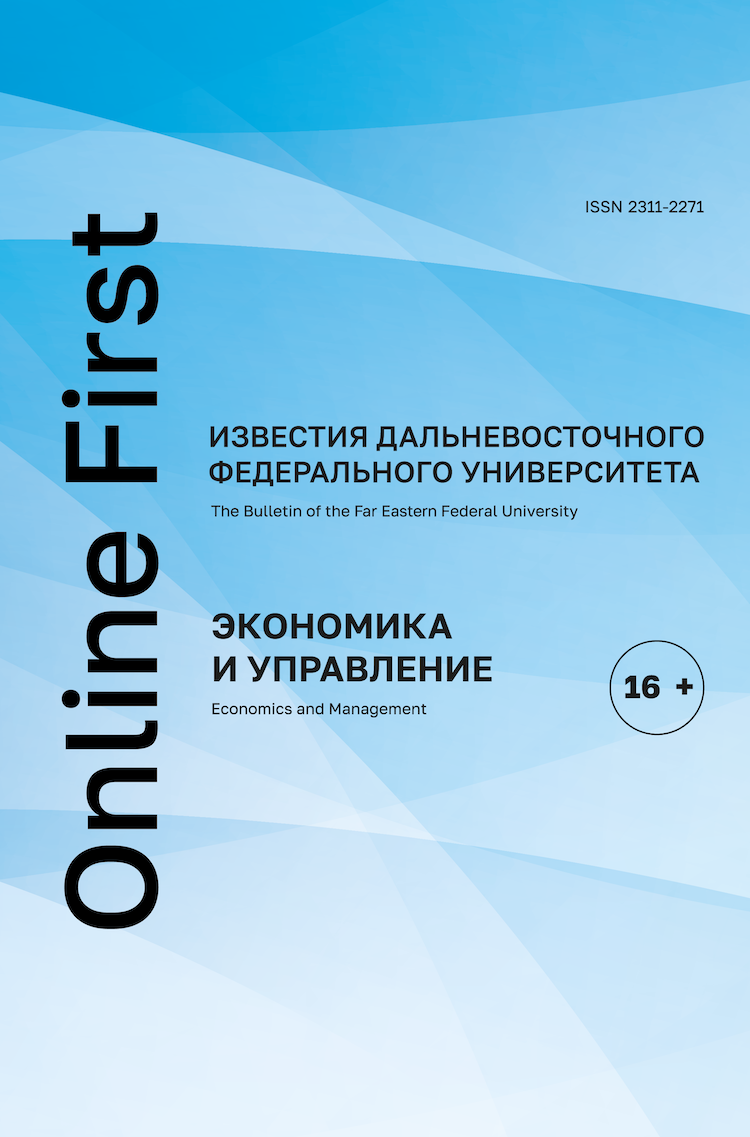Компаративный анализ восприятия предпринимательских возможностей и способностей1
Аннотация
Ключевые слова
Полный текст:
PDFЛитература
Kraemer-Eis H., Lang F., Torfs W., Gvetadze S. European Small Business Finance
Outlook. June 2017. EIF Working Paper 2017/43. 2017. [Электронный ресурс]. URL:
http://www.eif.org/news_centre/research/index.htm (дата обращения: 16.12.2020).
Borbás L. The Role of SMEs in the European Entrepreneurship Policy // Volume of
Management, Enterprise and Benchmarking in the 21st Century II. Óbuda University,
Keleti Faculty of Business and Management, 2015, р. 71-88.
Muller P., Julius J., Herr D., Koch L., Peycheva V., Mckiernan S. Annual Report on
European SMEs 2016/2017. SME Performance Review. European Union. DirectorateGeneral for Internal Market, Industry, Entrepreneurship and SMEs. 2017.
Ю.С. Пиньковецкая // Известия ДВФУ. Экономика и управление. 1. 2021. 118–125
[Электронный ресурс]. URL: https://www.researchgate.net/publication/321268021
(дата обращения: 20.12.2020).
Renko M., Shrader R., Simon M. Perception of Entrepreneurial Opportunity: A General
Framework // Management Decision, 2012, Vol. 50 (7), p. 1233-1251.
Davidsson P. Entrepreneurial opportunities and the entrepreneurship nexus: A reconceptualization // Journal of Business Venturing, 2015, Vol. 30 (5), р. 674-695.
Liñán F., Santos F., Fernández J. The influence of perceptions on potential entrepreneurs // International Entrepreneurship and Management Journal, 2011, Vol. 7, р. 373–
Bayon M., Vaillant Y., Lafuente E. Antecedents of perceived entrepreneurial ability in
Catalonia: the individual and the entrepreneurial context // Journal of Global Entrepreneurship Research, 2012, Vol. 5 (3), DOI: 10.1186/s40497-015-0020-0.
Walker J. K., Jeger M., Kopecki D. The role of perceived abilities, subjective norm, and
intentions // Journal of Entrepreneurship, 2013, Vol. 22 (2), р. 181–202.
Naser M., Afzal I., Siddiqui S., Dutta S. Determinants of entrepreneurial capability (EC)
environment in ASEAN-05 economies - a log-linear stochastic frontier analysis // Journal of Global Entrepreneurship Research, 2018, Vol. 8 (14), DOI: 10.1186/s40497-018-
-y.
Carlianne P., Stephens H., Weinstein A. Where are all the self-employed women?
Push and pull factors influencing female labor market decisions // Small Business
Economics, 2016, Vol. 46 (3), р. 365-390. DOI: 10.1007/s11187-015-9697-2.
Chhabra M., Karmarkar Y. Gender gap in entrepreneurship - a study of small and
micro enterprises // ZENITH International Journal of Multidisciplinary Research,
, Vol. 6 (8), р. 82-99.
Sperber S., Linder C. Gender-specifics in startup strategies and the role of the entrepreneurial ecosystem // Small Business Economics, 2018, Vol. 53(4), р. 1-14, DOI:
1007/s11187-018-9999-2.
Grosser K., Moon J. CSR and feminist organization studies: towards an integrated theorization for the analysis of gender issues // Journal of Business Ethics, 2019, Vol. 155
(2), р. 321-342, DOI: 10.1007/s10551-017-3510-x.
Dabic M., Daim T., Bayraktaroglu E., Novak I., Basic M. Exploring gender differences
in attitudes of university students towards entrepreneurship // International Journal of
Gender and Entrepreneurship, 2012, Vol. 4 (3), р. 316–336.
Tsai K.H., Chang H.C., Peng C.Y. Refining the linkage between perceived capability
and entrepreneurial intention: roles of perceived opportunity, fear of failure, and gender
// International Entrepreneurship Management Journal, 2016, Vol. 12, p. 1127–1145.
Global Entrepreneurship Monitor 2018/2019. Women’s Entrepreneurship Report.
Global Entrepreneurship Research Association (GERA). London Business School,
London, United Kingdom. 2019.
Pinkovetskaia I., Slepova V. Estimation of Fixed Capital Investment in SMEs: the Existing Differentiation in the Russian Federation // Business Systems Research, 2018,
Vol. 9 (1), р. 65-78, DOI: 10.2478/bsrj-2018-0006.
(c) 2021 Научный журнал "Известия Дальневосточного федерального университета. Экономика и управление"
© Дальневосточный федеральный университет, 1996-2022.
© Научный журнал "Известия Дальневосточного федерального университета Экономика и управление" - 16+.
Свидетельство о регистрации средства массовой информации ПИ № ФС77-57575
Издатель - ФГАОУ ВО "Дальневосточный федеральный университет".
При перепечатке ссылка на Сайт Журнала обязательна.
Коммерческое использование размещенных материалов запрещено.
E-mail: sem-journal@dvfu.ru





